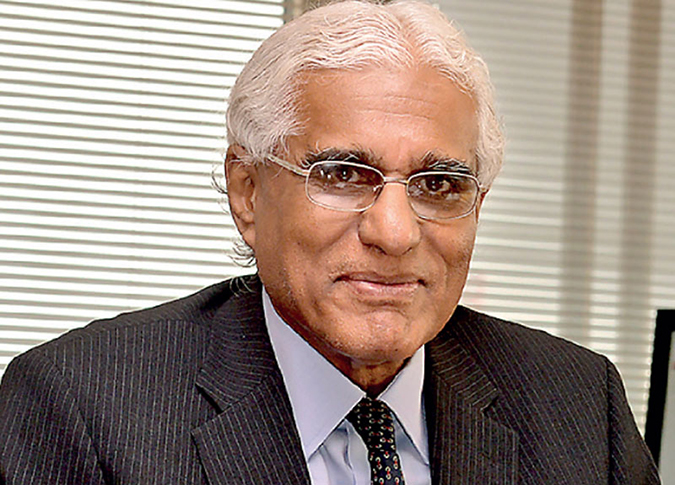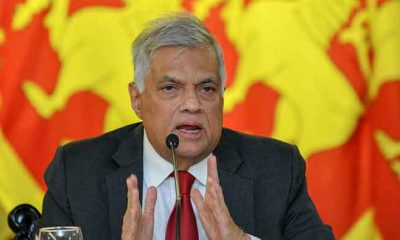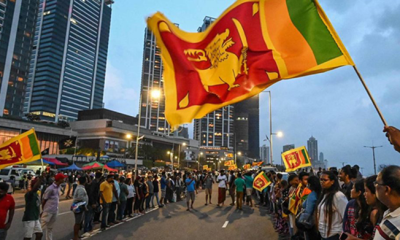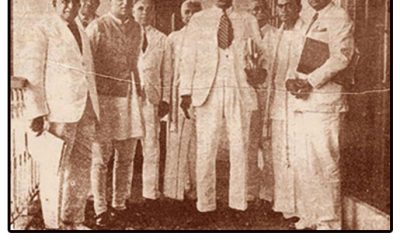News
Don’t let elections distract from stabilization warns Indrajit Coomaraswamy

By HIMAL KOTELAWALA
ECONOMYNEXT – If Sri Lanka allows elections to distract from the path of recovery, stabilization and growth, the country will be hit by a fresh crisis far worse than any before, former central bank governor Indrajit Coomaraswamy said.
Speaking at a forum organized by Cal, a Colombo-based investment banking group, Coomaraswamy said on Tuesday (Sept. 5) that Sri Lanka’s election calendar has historically resulted in the reversal of progress made under the 16 International Monetary Fund (IMF) programs that SL had undertaken until the latest extended fund facility (EFF).
“Every single time there has been an election, Sri Lanka’s macroeconomic policies have become indisciplined. We’ve had 16 IMF programs before the current one. On many of them we did make progress in stabilization as we have done on this one. But as soon as an election approached, the progress that was made was reversed,” Coomaraswamy said.
“We’re supposed to be having elections next year. I hope we don’t have the same thing again. We must not allow the gains that we have made to be reversed through policy slippage.”
Critics of President Ranil Wickremesinghe and his administration have been demanding elections, but political analysts say there is no likelihood of a major election until the presidential polls due in November 2024.
Noting that Sri Lanka has never done well on structural reforms due to lack of political will in the face of the “losers’” being louder despite being fewer in number, Coomaraswamy said such reforms should now be pursued vigorously.
“Unless we do differently this time, we will not be able to get into a sustained recovery,” he said.
“This time around, if we allow elections to distract us from the path of stabilization and recovery and then sustained growth, the crisis that will hit us will be worse than anything that we’ve had in the past. It will be worse than what we had some 18 months ago. We should remember that.”
The former central bank chief called for a mould where economics is not seriously undermined by the electoral calendar.
“That has to change. If it doesn’t, we will lose what we have gained so far and the consequences will be far worse than we’ve ever experienced in the past,” he said.
Explaining why the next crisis, if it were to come to pass, would be worse, Coomaraswamy said Sri Lanka would be entering it with a far lower level of resilience, both in the economy and among the people. Next time around, he said, the impact is going to be much more painful.
“The multiple crises of the present have had such a devastating impact that we’ll be at a much much lower level of resilience going into the next one. We need to make sure we never allow that to happen,” he said.
The electoral calendar was among a series of risks that Coomaraswamy identified as possible obstacles to Sri Lanka’s recovery. Other risks he highlighted included climate risks such as the ongoing El Nino phenomenon and elevated geopolitical tensions which demand a more transparent and prudent external relations policy.
“The world has become a more tense place. That will have an impact on global supply chains and commodity prices. We need to be proactive and factor all that in and see how best to have contingency plans to cope with the impacts of this,” he said.
On the domestic front, the senior economist said Sri Lanka must achieve a primary surplus in the budget to keep the debt stock in check and must also work towards a transformation in exports, aiming at a more diversified export basket with a more complex set of products as well as a diversification of markets.
“Those two things will take us out of this twin-deficit category that we have been stuck in for many years, if we do it well,” he said.
Coomaraswamy said the programme now under way to restructure state-owned enterprises (SOEs) is also critical and should ideally move faster.
“We need to use whatever political capital is necessary to give tailwind to this process,” he said.
Coomaraswamy went on to say that Sri Lanka needs to move faster in factor market reforms, improving the investment climate and investment promotion. He also called for expediting new free trade agreements (FTAs).
“There are negotiations to convert the Indian FTA into an economic partnership agreement under ECTA (Economic and Technology Cooperation Agreement). Negotiations for an FTA with China are also ongoing, as well as with Thailand. These need to be pushed forward,” he said.
“The revitalization of the Singapore FTA is a good thing. It will give us opportunities in terms of investment as well as using that FTA to penetrate the ASEAN market, particularly in e-commerce.”
Coomaraswamy commented on President Wickremesinghe’s plans to join the Regional Comprehensive Economic Partnership (RCEP), a free trade agreement among the Asia-Pacific nations of Australia, Brunei, Cambodia, China, Indonesia, Japan, South Korea, Laos, Malaysia, Myanmar, New Zealand, the Philippines, Singapore, Thailand, and Vietnam.
“I don’t think we’ll be able to do it very quickly. The kind of reforms needed to be able to join RCEP will be quite challenging. But it’s a good aspiration to have and it’s a good signal to give to say that we’re keen on joining,” he said.
On Sri Lanka’s relations with India and proposals for a land bridge and grid connectivity on top of plans to improve sea and air connectivity, Coomaraswamy said Sri Lanka can benefit from increased connectivity with the Indian economy.
“We’ve had proximity [to India] forever but the very poor infrastructure in both countries has made transaction costs for cross border economic activity very high. India also had an inward looking strategy for a long time, but now it has its Neighbourhood First policy and its Made In India policy, all of which will create new opportunities for countries in the region,” he said, noting that transaction costs are in fact coming down with improvements in roads, railways, airports etc in both countries.
“We should make a concerted effort to piggyback onto the Indian story,” he said.
In terms of addressing corruption vulnerabilities, which is a key pillar of the ongoing IMF programme, Coomaraswamy said implementation is key.
“Laws mean nothing unless they’re implemented effectively. So it is to be seen whether the anti-corruption act which is better aligned with UN convention on corruption is implemented,” he said.
“The IMF diagnostic on addressing corruption vulnerabilities has just about been finalized. It should be shared with the government this month. Whether or not the government is serious about addressing vulnerabilities will be demonstrated in how it treats the recommendations of this diagnostics study. It will be a good litmus test for the government’s attitude,” he said.
Sri Lanka saw a 31% surge in poverty over the last four years – from four million people in 2019 to seven million in 2023, according to a study by LIRNEasia – and a number of reports have come out on increased vulnerability, child malnutrition and other indicators of socioeconomic deterioration. Coomaraswamy, while recognizing this, said however that the MF cannot be blamed. The ongoing anti-IMF rhetoric has centered its messaging around the IMF, laying the blame for all of Sri Lanka’s ongoing ills at its door.
“People blame the IMF program. People who do that fail to take into account that the country was in a very big hole before the IMF came. We had massive shortages of essentials, long queues, etc. Very severe problems. Dollar and LKR illiquidity at the time that was causing all these problems, which have been addressed to a significant extent because of the IMF program,” said Coomaraswamy.
“So you can’t blame the IMF program. These problems were there because of the hole we had fallen into and that hole was caused by various things which everybody knows,” he said, declining to elaborate on the causes.
The former central bank governor also called for a strengthened social safety net.
“When you have as big an adjustment as we have to make, when the hole is as big as the one that confronts us, there is a strong case for strengthening the social safety net upfront,” he said, adding that the ongoing Aswesuma programme should ideally have been launched sooner.
“It wouldn’t have done away with the increase in poverty and vulnerability, but it could’ve mitigated it to a significant extent,” he said.
News
US sports envoys to Lanka to champion youth development

The U.S. Embassy in Colombo welcomed the U.S. Sports Envoys to Sri Lanka, former National Basketball Association (NBA) and Women’s National Basketball Association (WNBA) players Stephen Howard and Astou Ndiaye, from June 8 through 14.
The Public Diplomacy section of the U.S. Embassy said that it would launch a weeklong basketball program intended to harness the unifying power of sports, made possible through collaboration with Foundation of Goodness and IImpact Hoop Lab.
While in Sri Lanka, Howard and Ndiaye, both retired professional basketball players, will conduct a weeklong program, Hoops for Hope: Bridging Borders through Basketball. The Sports Envoys will lead basketball clinics and exhibition matches and engage in leadership sessions in Colombo and Southern Province for youth aged 14-18 from Northern, Uva, Eastern and Western Provinces, offering skills and leadership training both on and off the court. The U.S. Envoys will also share their expertise with the Sri Lanka Basketball Federation, national coaches, and players, furthering the development of basketball in the country. Beyond the clinics, they will collaborate with Sri Lankan schoolchildren to take part in a community service project in the Colombo area.
“We are so proud to welcome Stephen and Astou as our Sports Envoys to Sri Lanka, to build on the strong people-to-people connections between the United States and Sri Lanka,” said U.S. Ambassador Julie Chung. “The lessons that will be shared by our Sports Envoys – communication, teamwork, resilience, inclusion, and conflict resolution – are essential for leadership development, community building, equality, and peace. The U.S. Sports Envoy program is a testament to our belief that sports can be a powerful tool in promoting peace and unity.”
News
Rahuman questions sudden cancellation of leave of CEB employees

SJB Colombo District MP Mujibur Rahuman in parliament demanded to know from the government the reasons for CEB suspending the leave of all its employees until further notice from Thursday.
MP Rahuman said that the CEB has got an acting General Manager anew and the latter yesterday morning issued a circular suspending leave of all CEB employees with immediate effect until further notice.
“We demand that Minister Kanchana Wijesekera should explain this to the House. This circular was issued while this debate on the new Electricity Amendment Bill was pending. There are many who oppose this Bill. The Minister must tell parliament the reason for the urge to cancel the leave of CEB employees,” the MP said.However, Speaker Mahinda Yapa Abeywardena prevented Minister Wijesekera responding to the query and said that the matter raised by MP Rahuman was not relevant.
News
CIPM successfully concludes 8th Annual Symposium

The Chartered Institute of Personnel Management (CIPM) successfully concluded the 8th Annual CIPM Symposium, which took place on 31st May 2024. Themed “Nurturing the Human Element—Redefining HRM in a Rapidly Changing World,” the symposium underscored the pivotal role of human resource management (HRM) in today’s dynamic global landscape. Since its inception in 1959, CIPM has been dedicated to advancing the HR profession through education, professional development, and advocacy, solidifying its position as Sri Lanka’s leading professional body for HRM.
Ken Vijayakumar, the President of the CIPM, graced the occasion as the chief guest. The symposium commenced with the welcome address by the Chairperson, Prof. Arosha Adikaram, followed by the Web Launch of the Symposium Proceedings and Abstract Book by the CIPM President. The event featured distinguished addresses, including a speech by Chief Guest Ken Vijayakumar, President of CIPM, and an address by Guest of Honor Shakthi Ranatunga, Chief Operating Officer of MAS Holdings Pvt. Ltd., Sri Lanka.
The symposium also featured an inspiring keynote address by Prof. Mario Fernando, Professor of Management and Director of the Centre for Cross Cultural Management (CCCM) at the University of Wollongong, Australia.
Vote of Thanks of the inauguration session was delivered by Dr. Dillanjani Weeratunga, Symposium Co-chair.
The symposium served as a comprehensive platform for researchers to present their findings across a wide range of critical topics in HRM. These included Cultural Diversity and Inclusion, Talent Development and Retention, Ethical Leadership and Corporate Social Responsibility, Adapting to Technological Advancements, Mental Health and Well-being at Work, Global Workforce Challenges, Employee Empowerment, and Reskilling and Upskilling.
The plenary session was led by Prof. Wasantha Rajapakse. Certificates were awarded to the best paper presenters during the valedictory session, followed by a vote of thanks delivered by Kamani Perera, Manager of Research and Development.
The annual symposium of CIPM was a truly inclusive event, attracting a diverse audience that spanned undergraduates, graduates, working professionals, research scholars and lecturers. This widespread interest highlights the symposium’s significance in the field of HRM, offering a unique opportunity for everyone to network and learn from scholarly brains.The CIPM International Research Symposium was sponsored by Hambantota International Port, Sri Lanka Institute of Information Technology (SLIIT), E B Creasy & Co. PLC, and Print Xcel Company.
























